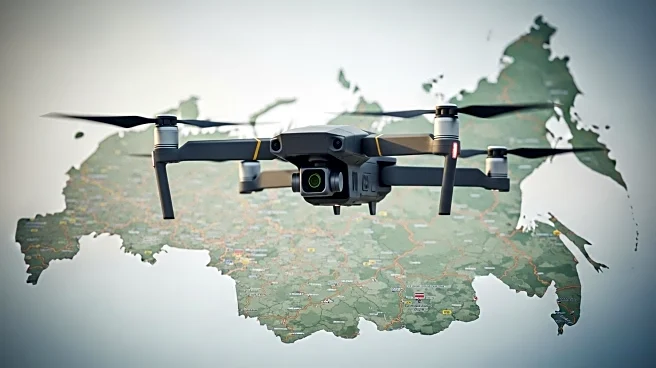What is the story about?
What's Happening?
Recent developments in the ongoing conflict between Russia and Ukraine have seen an increase in drone strikes, particularly targeting Russia's Belgorod region. According to Vyacheslav Gladkov, the governor of Belgorod, a Ukrainian strike on the village of Maslova Pristan resulted in three fatalities and at least nine injuries. This attack marks the third consecutive day of Ukrainian strikes in the region, which have left thousands without power. The strikes have caused significant damage to infrastructure, including homes, vehicles, and power lines. Ukraine has not officially commented on these attacks, but it has a history of targeting Russian territories during the conflict. Meanwhile, Russian forces continue to target Ukraine's energy infrastructure, aiming to disrupt power supplies as winter approaches.
Why It's Important?
The escalation of drone strikes by Ukraine into Russian territory, particularly in Belgorod, signifies a strategic shift in the conflict, potentially altering the dynamics of the war. These attacks have not only caused casualties but have also disrupted daily life and infrastructure in the affected regions. The targeting of energy facilities by both sides highlights the critical role of infrastructure in the conflict, with potential implications for civilian populations facing power shortages. The increased frequency of these strikes could lead to heightened tensions and further military responses from Russia, potentially escalating the conflict further. The situation also underscores the broader geopolitical implications, as international stakeholders may be drawn into the conflict through diplomatic or military support.
What's Next?
As the conflict continues, both Russia and Ukraine are likely to intensify their military strategies. Ukraine's focus on Russian oil refineries could lead to further economic disruptions within Russia, potentially affecting fuel supplies and prices. On the other hand, Russia's continued targeting of Ukrainian energy infrastructure could exacerbate humanitarian challenges in Ukraine, especially with winter approaching. The international community may respond with increased diplomatic efforts to de-escalate the situation, or potentially with sanctions or military aid to either side. The ongoing conflict will likely remain a focal point in international relations, with potential impacts on global energy markets and security dynamics.
Beyond the Headlines
The use of drones in modern warfare, as demonstrated in the Russia-Ukraine conflict, highlights a significant shift in military tactics. Drones offer a cost-effective and precise method of targeting, which can be deployed with relative anonymity. This development raises ethical and legal questions about the conduct of war and the protection of civilian populations. The increased reliance on drones could lead to changes in international law regarding warfare and the use of unmanned systems. Additionally, the conflict's impact on global energy markets could prompt a reevaluation of energy security strategies worldwide.

















